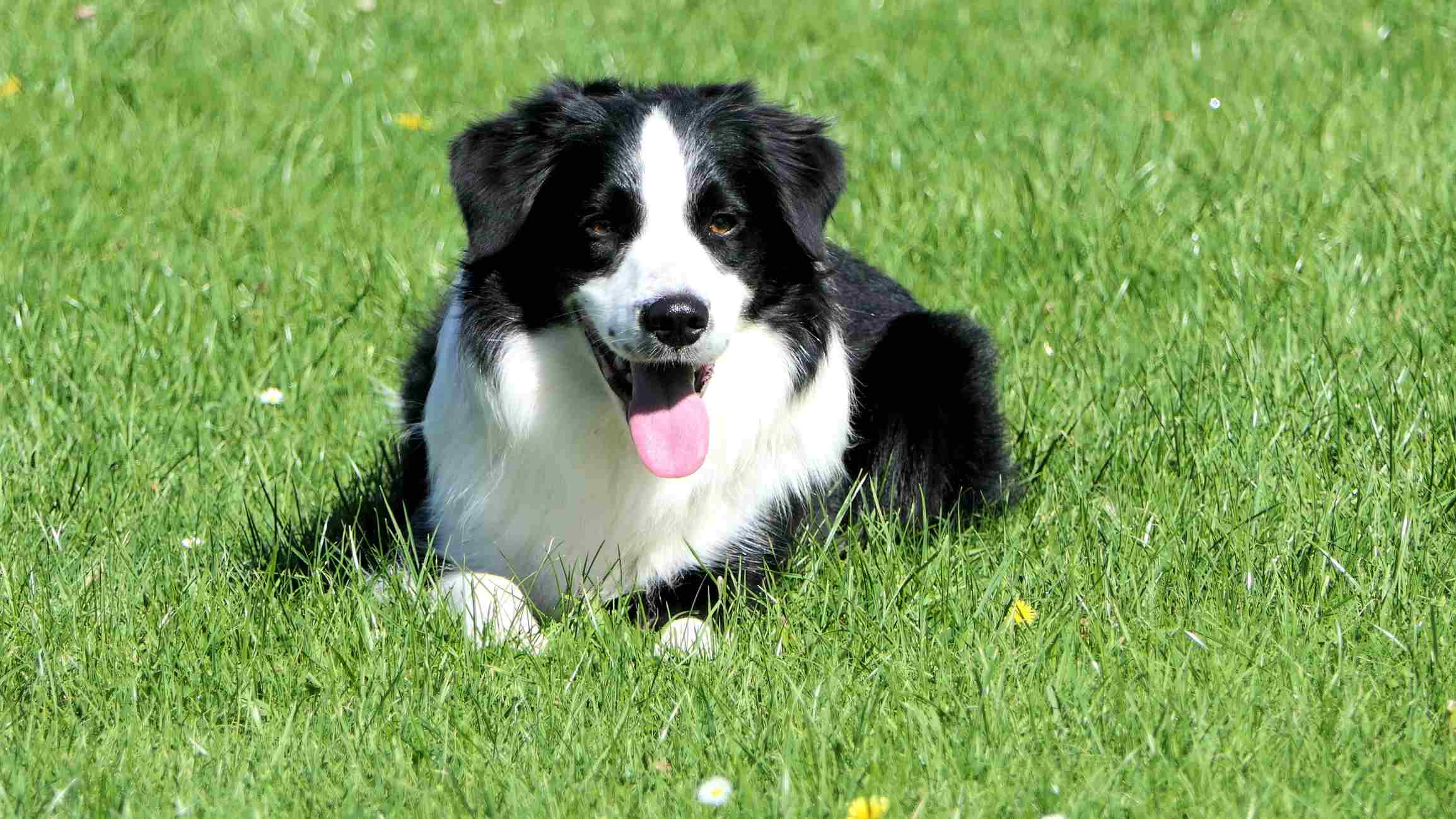The border collies are considered one of the most intelligent dog breeds and the class valedictorian of canines. They have lots of extracurriculars on their resume, such as herding, running, and best of all, search and rescuing.
If there were a dog breed that lived by the motto of “work hard, play hard,” it would be the border collies. They are known for being active, energetic, and workaholics that enjoy having their tasks done. And yes, playing fetch is one of them.
A true doer, border collies, stands out in numerous roles, but just by being your canine companion may be their best role yet.
But how much do border collies eat? Is there a border collie feeding chart that we should all follow?
Border collies are breeds that are active that require plenty of nutrition to keep their energy levels going. An average-sized border collie should take 1,000 calories worth of food a day. The exact amount a border collie should eat per day will depend on their age, weight, lifestyle, and what kind of food they eat.
A border collie’s energy levels, coat texture, and overall health can be negatively affected when they fail to take their required daily nutrition. Overfeeding is also a common mistake that fur parents make, especially since border collies can’t say no to food.
In this guide, you will learn the common mistakes you unknowingly make to your border collie and some tips and tricks to help you feed them their complete daily food requirements from puppy life to senior.
[toc]How Much Should a Border Collie Eat?
Border collies need higher calorific intake because they have a higher physical and mental stimulation than other dog breeds. The serving tips for a border collie will vary due to the vast range of dog food available.
But in practice, no matter the brand, it’s always best to measure the calories than just measuring the food amount by weight, age, and lifestyle.
A growing border collie may require lots of calories per day, while a senior border collie that is not as active before may only need fewer calories a day.
One way of calculating the appropriate nutrition for a border collie is by observing their behavior.
This is necessary because you need to ensure that they are not undereating or overeating. After all, we don’t want that. A dog’s lifestyle and the state is unique, so it’s always best to review at varying amounts when feeding.
How Often Should I Feed My Border Collie?
Most border collies cannot self-regulate their eating patterns, which is normal for their breed. It is not advisable to do free feeding because they may eat one day’s worth of dog foods in only ten minutes. A feeding routine is your best option here.
For adult border collies, feeding them twice a day will do the trick. On the other hand, you need to feed puppies more as they need it since they are growing. Three meals per day for border collies puppy is enough. You may also notice that puppies prefer lesser meals, like two times is also ok.
Other fur parents give their border collies a single large meal a day, which is not advisable as this can affect their performance, especially if yours is a working canine. Feeding a home-bound border collie with a single large meal a day will only cause them to become obese, and that is not good.
But are border collies good apartment dogs? Find out here.
Feeding a growing border collie three times per day is advisable. They should have more frequent feeding times than adult border collies. But reducing the feeding times on your dog’s continuous growth is necessary to ensure a healthy and balanced diet.
How Much Should I Feed My Border Collie Puppy?

Border collie puppies need feeding three times a day. The overall amount required will vary depending on the quality of food provided.
For example, premium dog food for puppies comes with higher nutrients than those inexpensive dog foods. Cheaper dog foods have plenty of chemicals, filler ingredients, artificial colors, and 4D meats that, in the long run, can cause diabetes, cancer, and more severe health problems.
You can feed your puppy one-fourth cup of dog food three to four times per day. If they are underweight, you can increase it to half. They should be a young adult border collie at six to seven months; they can have two regular-sized per day.
Border Collie Puppy Feeding Chart
Since border collies puppies are continuously growing and changing weight and size, it would be not easy to pinpoint the exact amount of dog food to feed them. After all, we don’t weigh our pup from time to time before giving them meals and then feed them the amount of food that we think is right.
For that reason, border collies puppies are likely to have a stricter feeding routine. In the following section, you can see a border collie feeding chart for puppies.
Take note that this chart is not accurate since every puppy’s lifestyle is unique and different. It’s crucial to keep an eye on how your border collie puppy eats and adjust the diets they take accordingly.
As mentioned earlier in this guide, border collies are not good at regulating their meals, so pay attention to the amount of dog food you are giving your puppy and check if it’s too much, too little, or just enough.
Seventeen weeks old
From their first weeks until they become seventeen weeks old, three to four meals per day is enough feedings for your border collie puppy. At first sight, this may sound like a lot for them to take, but puppies, as we all know, eat plenty.
Puppies at this stage need a lot of calories per day to help their energy levels up and for them to thrive. Many small meals are better than a few large meals for puppies since they have small stomachs.
Ensure that you are feeding your puppy the dog food for their age. Most vets recommend dry food for border collies puppies. This type of food can highly support your puppy for growing fast and supply them with enough energy they need every day.
Seventeen weeks to twenty-six weeks old
From seventeen weeks old, border collie puppies will reach the intermediate stage. At this point, they are ready to eat larger meals, but not to the same extent as adults have.
In the same way, we don’t want to overfeed them, so you reduce the number of meals they take a day. At this time, feed your border collie puppies three meals a day of dry puppy food. Do not let go of puppy food at this stage yet.
Twenty-six weeks old and above
Once they become twenty-six weeks or six months old, a border collie puppy is now ready to switch to an adult feeding routine. At the same time, you should also increase the amount of dog food given for every meal while reducing the number of meals per day.
At this time, feed them twice per day, one in the morning and one in the evening, and make sure they have free access to water at any time of the day. But keep an eye on your border collie’s behavior to see if this transition works well for them because we don’t want to undereat them.
Two meals per day should be enough to keep their energy levels up to get through the day. It’s also advisable to continue giving a young adult border collie the dog food specifically made for puppies during this stage and only move on to the diet of an adult border collie once they reach one year old and beyond.
When to Switch a Border Collie Puppy on to Adult Dog Food?
When a border collie puppy grows older, its nutritional and caloric requirements also change. An adult young border collie will need lesser protein, vitamins and minerals, calcium, fewer fatty acids, and should have lesser fats as well.

When your border puppy reaches 80% of the average adult weight and size, that is the time to switch a border collie dog food to adult dog food— that’s about one year old. And once they become eighteen months old (one year and six months old), they will have to transition to fully adult dog food.
Following a proper border collie feeding chart will guarantee that your border collie takes the necessary nutritional requirements they need while growing.
Other than ensuring their nutritional requirements, there are other needs that we should be aware of. Find out how to provide their general needs on how to take care of a border collie.
How Much Should I Feed Adult Border Collies?
An adult border collie needs two meals per day. They need to be fed sustainably for ideal fitness and health to protect themselves from developing serious health problems.
The amount of food will have to depend on their size and the lifestyle they have. Enough nutritional requirements for adult border collies can be found at the back of any dog food product. You can also adjust their food based on their daily activities.
If yours is a working dog, then it would be best to feed them a little bit more than instructed at the back of the dog food product.
Whether yours is a working dog or not, it is always advisable to ensure that they receive enough nutritional needs to achieve a balanced diet to support their daily activities. A tip is, monitor giving treats as these are high in fat content.
What Are the Best Food for Border Collies Adult?
Even when an adult border collie requires lesser fat and protein, it’s best to have dog food that would become as maintenance. If a border collie is fully grown already, it would require to have at least 22% of protein and 12% of fat.
It is also advisable to include fruits, veggies, vitamins, and mineral supplements. Finding quality dog food products without chemical preservatives may be challenging, so sticking with naturally-preserved ones would do the trick.
What Are the Reasons Why Border Collies Are Overeating?

The reasons why border collies overeat are much the same as why humans overeat. Some of the most common reasons include:
Boredom – Border collies are as prone to boredom as humans, especially if they are left alone for an extended time without enjoyment. Border collies on free-feeding may eat to relieve their boredom instead of satisfying their hunger.
That said, it’s time to learn the helpful ways on how to keep a border collie busy.
Abnormal central nervous system – A border collie with an abnormal central nervous system can affect the dog’s ability to realize when they are full, so they know when to stop eating.
This abnormality may occur due to traumatic events like a severe blow on the head part or may be caused by parasites or other infections. Overeating due to damage of the nervous system may lead to a strange and uncontrollable shaking or seizure attacks.
Increased appetite – Border collies that move around too long without eating may end up bolting their dog food in desperation to satisfy their hunger. Overeating at one sitting may lead to vomiting, stomach problems, or worse, it could lead to bloating.
Hormonal imbalances – Hormonal imbalances may end up overstimulating a border collie’s appetite. Some of the common diseases caused by hormonal imbalances include diabetes and hypothyroidism.
Overfeeding – In many instances, overeating is the result of overfeeding. If a border collie is fed from time to time which is more than what’s inside a border collie feeding chat, they may start to assume that as the feeding schedule and be satisfied with more portions of food.
Stress – Humans gain weight because of stress eating, which can also become a problem for border collies.
What Are the Reasons Why Border Collies Won’t Eat?
There are several reasons why border collies refuse food. Some reasons include:
Lack of exercise – Border collies are known for being energetic and are best to accompany you to work with. That said, they need plenty of daily exercise. This breed has a highly efficient metabolism; they burn enough food to keep their energy levels up to keep in shape to work and be ready for daily activities.
If a border collie eats their morning meal without doing anything during the day, it’s likely that they lost their appetite to eat the meal later. Border collies should have one to two hours of exercise a day. This is to ensure that they are physically fit and their appetite is high at mealtimes.
Teach your border collie some exercises now, check out the easy tricks to teach a border collie and say adios to lack of exercise!
Excessive treats or scraps – I know, I get it, it’s hard not to treat our furry friends, but for others, it can ruin their appetite for mealtimes. Whether the treats or scraps have dropped their appetite, or your border collie has come to recognize that if they wait long enough, they will receive something tastier than their actual meals.
It is advisable to avoid giving table scraps and only feed healthy, low-calorie treats that will not suppress their appetite. And it is important to ask everyone around the house about this because even if you are not slipping them food, somebody else maybe.
Health problems – Last but not least, border collies refusing food may be due to an underlying health problem. If you can’t see a possible reason as to why your dog is refusing their food, it’s time to schedule an appointment with your vet ASAP.
Also, once a border collie hasn’t received any food for a day or two, by this time, they need to acquire nutrients, and going to a vet won’t disappoint. Refusing to eat or a suppressed appetite can be a sign of serious health problems. This doesn’t mean that refusing food is always a sign of a health problem, but it can be the case.
Final Thoughts
So there you have it! You already know the tips and tricks about feeding your border collie properly, ensuring that they receive the complete nutritional requirements daily. Plus, the border collie feeding chart and all explanations above can guide you.
At first, it can be hard to determine the exact feeding amount from puppy life to senior, and as a fellow fur parent, I am glad to share my knowledge and be of help. If you have further questions or concerns, schedule an appointment with your vet and talk about it now. After all, a professional vet will safely always address the problems as best as possible.


